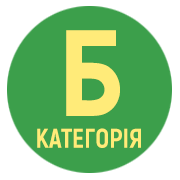SITUATIONAL OBJECTIVES WITH GROUND KNOWLEDGE AS EFFECTIVE ASSIGNMENT OF FORMATION OF PROFESSIONAL COMPETENCIES OF MAJOR FACULTY WORKERS
Abstract
The article aims to theoretically explain the new scientific problem of forming the professional competencies of future fakivs by the way of establishing situational tasks from earth science. The effectiveness of situational tasks has been confirmed with enhanced understanding of material, the development of critical thinking, problem-solving and creative thinking, communication skills and the development of decisionmaking Methodical planting of situational tasks from ground science in the professional training of educational specialties 201 Agronomy and 193 Geodesy and land management has been identified. Scientific research and literary developments have been analyzed regarding approaches to the development of situational tasks. The models of the situation of the Zavdan, such as a model of situational head to Rospіznann, the situation of the Zavdannya on Pidztrazhannya, the situation of the modeling, for the Maybotniye geodesist, was applied to the butt of the same time as he was applied to the b utt Methodical planting of various types of initial situations, aimed at activating the initial process and the development of practical skills in earth science workers, to which lie: situation-illustration: in this type of situation They were used to demonstrate specific applications from the practice of an agronomist, where the patterns and mechanisms of action of farmers are revealed ; situation-to-the-right: this type of situation is transmitted to the highest level by the investigators with the help of special information and literature; situation-problem: conveying a variety of real problems that arise in the sphere of agricultural practice; situation-assessment: specific approaches and approaches are demonstrated, followed by their results, the developers were given the task of identifying the means and mechanisms for the development of unsafe situations and approaches to their elimination ii. It has been proven that the development of situational tasks in the trained discipline of soil science can lead to the acquisition of theoretical knowledge and the development of practical skills, critical thinking among modern agronomists, which are important competencies for successful production. personal activity. The importance of situational ground knowledge tasks for workers has been identified, including: mastering the skills and techniques of comprehensive situation analysis; efficiency in making decisions in real time; for additional information to clarify the exit situation; distillation of theoretical knowledge for the analysis of practical problems; development of skills of independent praise and decision-making based on group analysis of the situation; On the practical side, I realize that it is possible to learn from the benefits, eliminating the backlash.
References
2. Кліх Л. В. Теоретичні і методичні засади підготовки магістрів аграрного профілю у дослідницькому університеті : автореф. дис. … д-ра пед. Наук : 13.00.04 – теорія і методика професійної освіти / Житомир. держ. ун-т ім. І. Франка. Житомир, 2014. 40 с.
3. Кулько В. А. Сутність і структура готовності майбутніх аграріїв до професійної діяльності. Вісник Запорізького національного університету. 2011. № 2 (15). С. 193–197.
4. Москаленко О. А., Москаленко Ю. Д., Коваленко О. В. Ситуаційні задачі як продуктивна основа сучасної системи фахового становлення майбутнього вчителя математики. Педагогічні науки: теорія, історія, інноваційні технології. 2016. № 2. С. 347–356. URL : http://nbuv.gov.ua/UJRN /pednauk_2016_2_44.
5. Оніпко В. В., Поспєлова Г. Д. Бінарний підхід у формуванні професійної компетентності майбутніх аграріїв. Сучасні аспекти модернізації науки: стан, проблеми, тенденції розвитку : матеріали XXV міжнар. науково-практ. конф. / за ред.: І. В. Жукової, Є. О. Романенка. Рига : ВАДНД, 2022. С. 283–288. URL : https://dspace.pdau.edu.ua/server/api/core/bitstreams/2b0d8901-0556-44f0-96b7-31829f5b3174/content.
6. Оніпко В., Поспєлов С. Міщенко О. Ситуаційні завдання як засіб формування професійних компетентностей майбутніх агрономів. Актуальні питання забезпечення якості вищої освіти : матеріали 55-ї науково-методичної конференції викладачів і аспірантів. Полтава : ПДАУ, 2024. С. 44–47.
7. Оніпко В., Япринець Т., Келемеш А. Технологізація освітнього процесу як об’єктивна тенденція розвитку сучасної професійної освіти. Українська професійна освіта. 2022. Вип. 11. С. 47–56. URL : https://upepnpu.pnpu.edu.ua/article/view/275539. DO I: https://doi.org/10.33989/2519-8254.2022.11.275539.
8. Сидоренко О. О., Чуба В. П. Ситуаційна методика навчання : теорія і практика. Київ : Центр інновацій і розвитку, 2001. 256 с.
9. Ситуаційний аналіз або Анатомія Кейс-методу / під ред. Ю. П. Сурміна]. Київ : Центр інновацій та розвитку, 2002. 286 с.
10. Як викладати ситуаційні вправи / за ред. О. І. Сидоренка. Київ : Центр інновацій та розвитку, 1999. 64 с.






